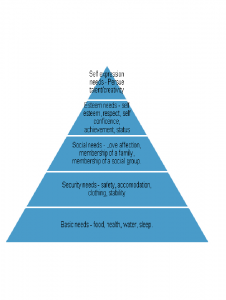Motivation can arise from inside us, or it can be imposed upon us externally by need. Many people are motivated to go to work everyday to jobs they may not enjoy, and even strive for promotion, because they need the money. An example of internal motivation might be people who are determined to climb Everest or express themselves artistically.
Finding an activity which fulfils both internal and external needs is ideal. Read more about this on the page: Commitment to a valued and meaningful cause.
The absence of motivation to take the actions that move us forward in your life is serious and can have serious consequences. It can be a symptom of depression or other health conditions. There is a subtle but significant difference between being stuck in a rut – where if we keep trying different things something will work eventually, and sinking in a bog, where if we do nothing we continue to deteriorate.
The Internet, including this site, is full of helpful advice and top tips and all of them require us to do something. For people in the grip of emotional turmoil, depression, paralysed with poor self esteem or habitually chaotic, adhering to the structure of new activities or the discipline of changing old habits is hard.
In order to be resilient in life we have to be willing to care for ourselves. If we cannot care for ourselves we must get help. If we do neither it can become difficult to recover, change our lives or even just move forward a tiny bit.
Sources of help:
You can get advice from your GP about how to access counselling.
You can also contact the British Association of Counsellors.
You can speak with a trusted friend, colleague, teacher.
Ikigai is a Japanese concept which captures the various aspects that work together to motivate an individual. It has been translated a number of ways, for example “reason for being” or “What makes you get out of bed in the morning“.
Ikigai has 4 main components: What you are good at; what you love; what the world needs; what you can be paid for.
The components are then combined. For example when you combine what you are good at with what you love you should have passion for what you do.
“What you are good at” is not always obvious early in life, children and young people benefit from a broad range of experiences and learning in order to have a wide range of possibilities to explore. The Ikigai of an individual may not be realised until maturity.
There is a lot of material on the internet about Ikigai, so if you are interested in the concept, google it.
Ikigai is about what we do rather than what we want to achieve.
Goals
Most research into motivation has been written about motivation at work, although there are transferable concepts. For example the use of goal setting – where the advice “do your best” has been contrasted with setting challenging goals which require people to improve their performance. The former seems to do little to motivate people[1].
There is also the concept of the employer/employee contract – which goes beyond the written contract of employment and includes things like training, being treated fairly, working in a pleasant environment. It has been demonstrated that when these informal, quality of life items deteriorate in the workplace, so does the motivation of employees[2]. In our personal lives we can become discouraged if a series of seemingly unimportant things go wrong and our quality of life deteriorates. We demonstrate resilience when we persevere despite these setbacks.
Most people are motivated most of the time, whether by the need to provide for themselves or by a wish to achieve. Another frequently used tool in understanding motivation is Maslow’s hierarchy of needs. This pyramid places the need for food and shelter at the bottom and the need for self fulfilment at the top. It has a long history and has been used, adapted and criticised in a variety of different contexts but it does seem to describe how most people set their priorities. It is unlikely that someone will be able to take a lot of time to reflect on their lives and themselves if they don’t have anywhere to sleep or are hungry.
A paradox in Maslow’s hierarchy of needs is that while ‘Esteem needs’ are located second from the top, it is clear that in our society there are people who neglect their more basic needs because they don’t seem to be able to value themselves or their lives enough to ensure that their basic needs are met.
This issue is explored on a further page: Self Esteem and Motivation. Click on the words “Self Esteem and Motivation” to read more.
[1] Latham, G. Locke, E. “Goal Setting—A Motivational Technique That Works”. Organizational Dynamics, Autumn 1979.
[2] SELS, L. JANSSENS, M. AND VAN DEN BRANDE, I. “Assessing the nature of psychological contracts: a validation of six dimensions” Journal of Organizational Behavior J. Organiz. Behav. 25, 461-488 (2004) Published online in Wiley InterScience (www.interscience.wiley.com). DOI: 10.1002/job.250

